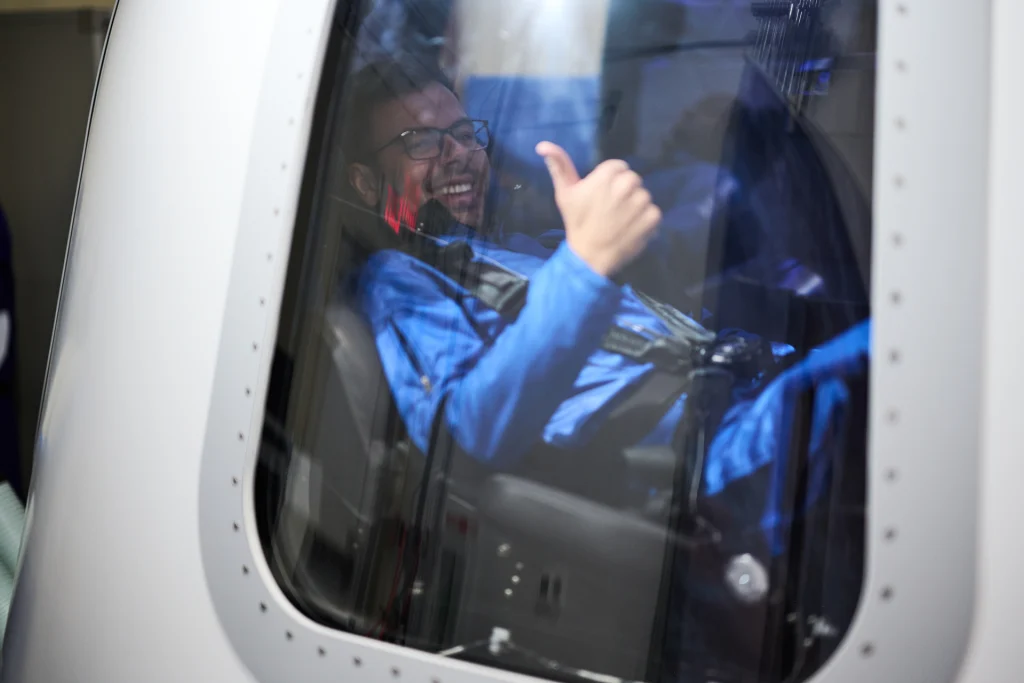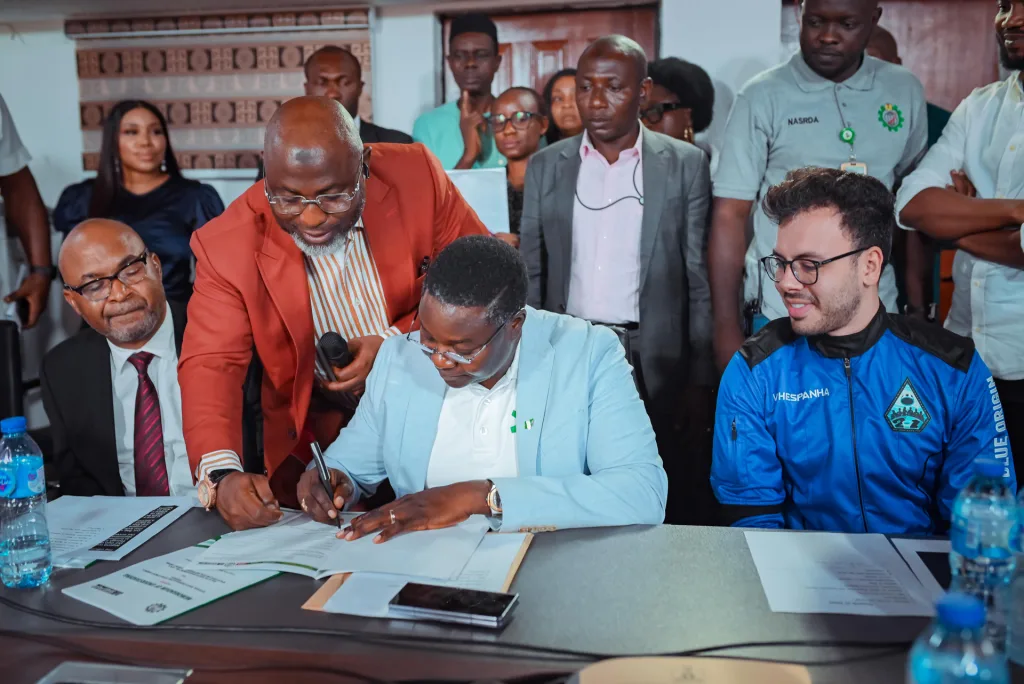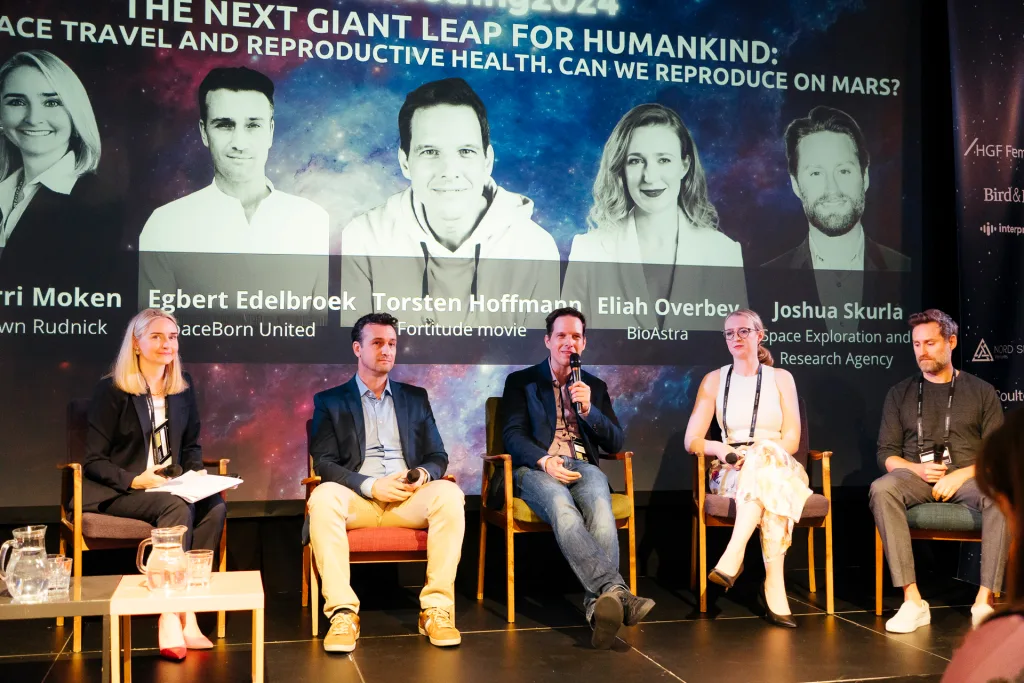When the fledgling Space Exploration and Research Agency (SERA) sent Victor Correa Hespanha into suborbital space with Blue Origin’s NS-21 mission two years ago, it hoped to spark more interest in STEM education in a country not known for its space industry. What no one expected was the level of excitement it generated. The 28-year-old civil engineer spent two weeks as the most famous person in Brazil, behind football star Neymar Júnior.
“We were surprised because Brazil had had an astronaut, Marcos Pontes, about 16 years previously. But there hadn’t been a relatable young person and he became a cause célèbre in Brazil,” says Sam Hutchison, a British aerospace entrepreneur who cofounded SERA with American film producer Joshua Skurla.
But when Blue Origin execs took note, Skurla spotted an opening. “We said, `Look, if we did this again, we’d buy all six seats and send six people from countries that have never had astronauts before,’” he recalls. “And they said, `If you wanna do that, we’re all in. We’ll partner with you.’”
Later this year, SERA will open applications for aspiring spacefarers to fly and run experiments aboard Blue Origin’s New Shepard rocket, commencing one of the most novel blueprints for civilian space entrée: a reality program-style competition and docuseries for underserved nations designed to democratize space exploration, research, and career guidance. (Aspirants can preregister here.) “We’re not trying to make it The Right Stuff, but something that will stimulate STEM and space excitement across those communities,” says Skurla.

Candidates from five countries and regions with historically little to no access to space, plus one from the global public, will vie for six seats and 24 experiment spots aboard New Shepard. As competition heats up, production crews will chronicle the candidates on social media to amplify engagement and help voters decide, culminating in a 2025 livestreamed launch from Blue Origin’s West Texas spaceport. The flight will reach the Kármán Line, the international boundary of space at 62 miles, for 3-4 minutes of weightlessness. Hutchison and Skurla have been meeting with streaming services about a docuseries covering the final stage of astronaut selection and a possible postlaunch feature-length documentary.
On November 16, SERA executives will discuss their competition at the SOMA Astronaut Summit, an Austin event where industry pioneers, thought leaders, and commercial astronauts will address the challenges and opportunities in the new era of commercial spaceflight.
SERA’s isn’t the only effort forging new pipelines to space. For example, the nonprofit Space for Humanity competitively selects civilian astronauts. Intuitive Machines offers internships to aspiring engineers from underserved communities. The Infinite is a touring immersive VR experience filmed aboard the International Space Station. But SERA is unusual in its combination of entertainment, public participation, and space career opportunities for marginalized nations.
Breaking barriers to space
Some 80% of astronauts, including private citizen astronauts and space tourists, come from the U.S., Russia, and China, according to Aerospace Security’s International Astronaut Database.
“We’re building a space agency for everyone,” says Skurla. “Look, there are 150 countries that have never had astronauts. So many people have been disenfranchised from participating in space. The problem is so big that we believe there’s a business to build around tackling it. Our selection processes are designed to be accessible to the largest number of people possible, while still doing meaningful science and a meaningful mission.”
This industry mash-up springs from their backgrounds and pandemic downtime. Skurla’s previous company Empyre Media, in which he’s still a shareholder, has strong ties to Latin America and invested in films that collectively generated more than $1 billion. As the former chairman of Reaction Engines, Hutchison raised over $100 million for rocket propulsion technology. Despite such disparate industries, the entrepreneurs met through mutual friends. During the pandemic, they brainstormed leveraging the changing media and space landscapes into a profitable socially conscious and consumer-driven business. Both are now working full-time on SERA.
“We started to think about how you could activate young people from regions or nations that don’t have space programs, astronauts, or access to higher education preparing them for careers in space science,” says Hutchison, crediting lower launch costs, shorter training periods, and private space sector autonomy with making space more accessible to civilians. “People find space absolutely fascinating, and media plays a big part in how you can aggregate a young, global community.”
After launching in 2022 and seeing Brazil’s response to Hespanha’s flight, SERA began lining up funds and sponsors for this next phase. Besides Blue Origin, the startup keeps its sponsors and financials under wraps, although it anticipates additional income from registration fees, media licensing, and advertising. Total mission costs will include the mission platform development, content production, science experiments, and marketing. They’re also exploring engaging the creative communities in those nations with a call to artists to decorate the parachute panels. Despite incorporating in the U.S., staff operate virtually from India, Brazil, and Nigeria, with Hutchinson in London, and Skurla, shuttling between London and Chamonix, France. Hespanha now leads SERA’s Latin America business development.

Having a representative astronaut makes space seem much more attainable. Matthew Adepoju, director general of Nigeria’s National Space Research and Development Agency, notes that educated and tech-savvy youth comprise 60% of his country’s 220 million population—many keen to gain entrée to the new space economy.
“Space is considered elitist,” he says. “The relationship with SERA is poised to break down a lot of barriers for exploration of outer space. My drive to mainstream the private sector into Nigeria’s space ecosystem will also be greatly enhanced with a successful journey to space by a Nigerian astronaut. This program will also energize the scientists in Nigeria to have better beliefs in their ability to do things that are usually seen as impossible.”
Astronaut selection
For this competition, SERA is allotting five seats to candidates from Nigeria, India, Small Island Developing States (SIDS), and two more countries or regions to be announced. Anyone from those places can apply and vie for votes, which must come from citizens of their home country or region, including those living abroad. (So, for example, Nigerian citizens can only vote for Nigerian candidates.) Once they’ve chosen the top hundred from each country/region, the public from those locations will vote for their favorite candidate stories. The sixth seat will be open to applicants and votes from other countries not facing U.S. sanctions. SERA has developed methods to verify citizenship and residency.
SERA will then combine the top three from each place into three international crews of six candidates from the participating countries. Folks across the globe will then vote for crews instead of individuals. The most popular six-person crew wins, with runner-up crew members serving as backup astronauts.

“Anybody with a higher name recognition is more favorable in the beginning, but it doesn’t mean they’ll win,” says Skurla. “We want it to be story-driven—their desire to go to space, but never thought they had a chance.
“We not going to take any direct role in saying who can or cannot fly,” he adds. “Rather than a board committee choosing a candidate for the right CV, we’re saying, `Hey Nigeria, you guys get to pick who you want to send.’ Our big message is about empowerment. We’re asking people to come together and think about the space mission as their own and have a stakeholdership in it.“
Research selection
The competition will also call for 18 cellular biology experiments (three per seat) and six fluid dynamics experiments (one per seat) to gauge how those few minutes of microgravity will affect human physiology, fluid behavior, and cell function.
The physiology proposals should pose which astronaut biometrics to track and why. The fluid dynamics research calls for submissions of 3D tube designs that minimize liquid leakage during handling in flight. Cell biology proposals should outline which human cells to study, what they expect to see, and why that’s valuable to understanding the future of human activity and space.
For this portion, SERA has teamed with Christopher Mason, a Weill Cornell Medicine genomics professor, and Eliah Overbey, a University of Austin bioastronautics assistant professor. The pair will design the guidelines, run online tutorials, list the flight-approved materials, and curate the finalist proposals before public voting, which will feature on SERA’s website and social media.
“We’re helping to advise which proposals are feasible and which are not,” says Overbey. “We need to provide enough guidance so we can evaluate their experiments and make sure whatever they propose will fit into some meaningful context and be done during the three-minute microgravity period.”
During the flight, the astronauts will conduct the winning experiments, with the resulting data posted on SERA’s website and the NASA Open Data Portal for anyone to use. The professors hope to publish the results in scientific papers with the proposal winners as coauthors. “That way, they get their names on a research paper, so when they apply to college or look for a position in the field, they’ve started to build a track record of excellence to stand on,” says Mason.
“The spirit of the mission is to make the data publicly accessible, get more people into space, and more people thinking about it,” he adds. “What would be great is if some of the ideas did spin out into companies or were built upon.”
Beyond the competition, SERA is working with the participating countries’ government agencies and universities on ways to harness postflight momentum.
“We want to make sure there is a plan to use that coverage to encourage people to take up STEM and think about space in a different way,” says Hutchison. “People in a lot of these regions aren’t aware there are tens of billions of dollars being invested in space infrastructure. They might think differently about their academic choices if this program makes them aware this is happening. And that if they apply themselves, in the next 10 or 20 years they could be living and working in space.”
Login to add comment
Other posts in this group


Welcome to the world of social media mind control. By amplifying free speech with fake speech, you can numb the brain into believing just about anything. Surrender your blissful ignorance and swall

Few periods in modern history have been as unsettled and uncertain as the one that we are living through now. The established geopolitical order is facing its greatest challenges in dec

Substack and Patreon are vying to become creators’ primary revenue stream.
For most influencers, payouts from platforms like Meta or Google aren’t enough to build a sustainable career. R

The European Commission is coming for “SkinnyTok.”
EU regulators are investigating a recent wave of social media videos that promote extreme thinness and “tough-love” weight loss advice,

The infamous “Am I The A**hole?” subreddit is making its way to the small screen.
Hosted by Jimmy Carr, the new game show for Comedy Central U.K. will feature members of the public appea

Former employees of OpenAI are asking the top law enforcement officers in California and Delaware to s
